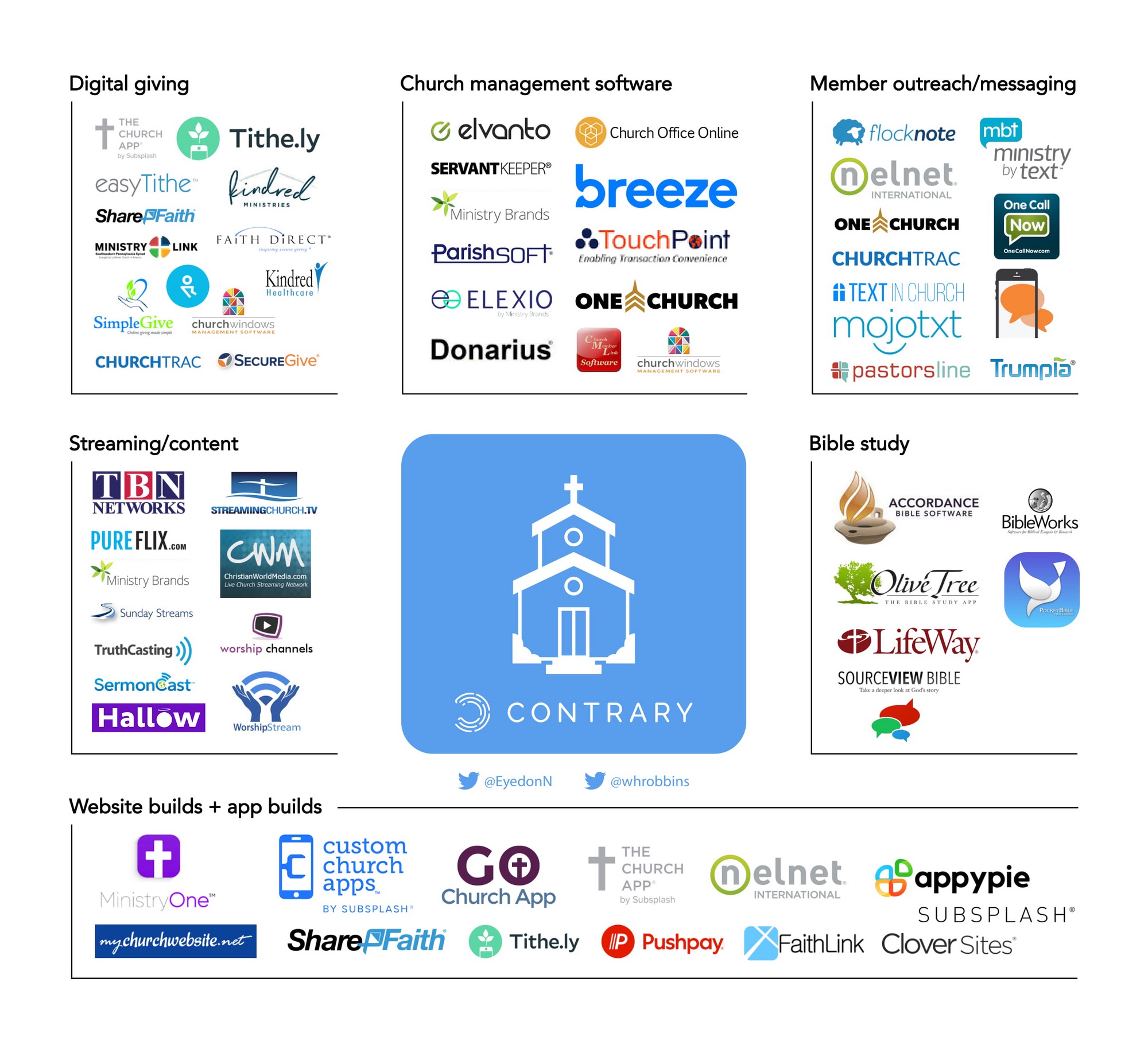Will Robbins
More posts from Will Robbins
There are more than 300,000 congregations in the U.S., and entrepreneurs are creating billion-dollar companies by building software to service them. Welcome to church tech.
The sector was growing prior to COVID-19, but the pandemic forced many congregations to go entirely online, which rapidly accelerated growth in this space. While many of these companies were bootstrapped, VC dollars are also increasingly flowing in. Unfortunately, it’s hard to come across a lot of resources covering this expanding, unique sector.
Market map
In broad terms, we can split church tech into six categories:
- church management software (ChMS)
- digital giving
- member outreach/messaging
- streaming/content
- Bible study
- website and app building
Horizontal integration is huge in this sector, and nearly all the companies operating in this space fall into several of these categories. Many have expanded through M&A.

The categories
- Church management software: Almost all are SaaS businesses, mostly using cloud hosting. Typical features include workflow management, virtual check-in for events, a database of members and online scheduling. Examples include Elvanto and One Church.
- Digital giving: Tithing (donating to your church), but through an app. Most companies offer the ability to use multiple types of payments, set a recurring donation and allow churches to track all of it. Typically they monetize by charging a mix of a percentage transaction fee + a flat 30 cents. Examples include easyTithe and Tithe.ly.
- Member outreach/messaging: Software for sending mass emails, mass texts and other methods of communication. Increasingly, these features are integrated into church management software products. Examples include Flocknote and MojoTxt.
- Streaming/content: Category with the most growth since COVID-19. Companies in this space offer reliable customer support, ease of use, the network effect within the religious community and easy onboarding to compete with more secular companies. Also includes companies that stream religious content for a mass audience, not on behalf of any church. Examples include Trinity Broadcasting Network and Hallow.
- Bible study: Smallest category, dominated by free software for translating, visualizing and annotating different editions of the Bible. Examples include Accordance and LifeWay.
- Website and app builds: Companies offering a mix of one-time fees and then monthly fees in exchange for building a customized app or website for a specific congregation. Custom apps often have some of the management software and member outreach tools found in those categories. Examples include Custom Church Apps (Owned by Subsplash) and ShareFaith.
Major players
Some of the biggest and most interesting companies in the space:
- Ministry Brands: No analysis of church tech is complete without mentioning Ministry Brands, the undisputed Goliath (biblical reference intended) of this sector. They’re a conglomeration of 32 brands (and rising) that cover all the categories mentioned, and are used by 115,000 churches and religious organizations worldwide. Their playbook is to acquire a new company, then upsell that company’s clients by offering their constellation of other services. In 2016, they raised an undisclosed amount from Insight Partners (estimated to be in the hundreds of millions at a valuation of about a billion). Notably, their reviews on Glassdoor average a 2.4.
- Flocknote: “Reach your sheep in an instant!” Flocknote, led by solo founder Matthew Warner, provides email and messaging services for churches. In 2019 it landed at number 1,520 on Inc.’s list of 5,000 fastest-growing companies, with a YoY revenue growth of 57%. The company was almost entirely bootstrapped, with the founder just taking one small loan and paying it back in full. In their marketing, they hit on the fact that more and more Americans just aren’t going to Sunday church, promising their platform results in “higher attendance, increased stewardship, and a more connected church.” It’s free up to 40 people, then you pay-as-you-go.
- Trinity Broadcasting Network: Founded in 1973, Trinity Broadcasting Network is the world’s largest religious television network. They don’t just broadcast though; they also make movies, operate two religious-themed theme parks and own an 11-acre RV park in Hollywood, Florida. Famous for their controversial “prosperity gospel” theology emphasizing personal wealth, they’ve grown by buying up smaller TV stations around the U.S., and now around the world. They’re not a tech company per se, and their monetization is traditional for a broadcasting company — advertisements and fees from dish and cable companies. However, they’re a major incumbent in this space, and have added new features like live recordings from prominent faith leaders (Netflix for religious content?)
- Tithe.ly: Started as a digital giving platform — after merging with Elvanto, it now offers church management software as well as website and app building services, all for a monthly subscription of $99. Tithe.ly is a great example of the kinds of small-cap M&A that dominate this sector. Their current strategy is to use their merger with Elvanto to upsell their existing clients by offering additional services, as well as to integrate Elvanto’s clients to their digital giving platform. Present in 22,000 churches in 50 different countries (up about 15% YoY). Recently raised a $15.6 million round entirely from angel investors (again, pun intended).
- Accordance Bible Software: Leader in Bible study software for serious academic/ministerial research, Accordance is one of the most unique companies in the space. Founded in 1989 and located in Altamonte Springs, Florida, Accordance features advanced searching, tools to study the original languages and offers an extensive library of dictionaries, commentaries and other writings related to the Bible. There are no subscriptions. All the pieces of the software can be downloaded one-by-one or in packages. In addition to selling Bible study guides, they’re also a marketplace for serious theological writing and historical research on religion. Highly recommend checking out their store for a look at old-school software sales.
Overview
Church tech is a surprisingly competitive space for a supposedly niche market, with many small startups across the six categories covered here. This is why most activity to date has consisted of user-acquisition land grabs and small-cap M&A. While many of these companies seem to be healthy, bootstrapped businesses, Ministry Brands is really the only tech company that’s achieved unicorn-level success.
In the U.S., church attendance and religiosity have precipitously declined in the past two decades. Clearly, innovation was needed in the space, and COVID-19 has broken the dam. Now, the services offered by these companies have gone from “nice to have” to “essential for my organization.” Ministry Brands, for example, had a 189% increase in individuals donating online and a 1,000% increase in church texting (from Congregants Embrace Online Worship in Record Numbers Amidst Coronavirus.) Could these lead to a permanently larger market, and more VC dollars flowing in to this space, despite declining numbers of congregations and shrinking religiosity in the U.S.?
Next, we’ll explore the operational side of a few companies in this space: how they’re growing, how they’re monetizing and what’s driving their thinking.
Disclosure: The author is an investor in Hallow.






























Comment